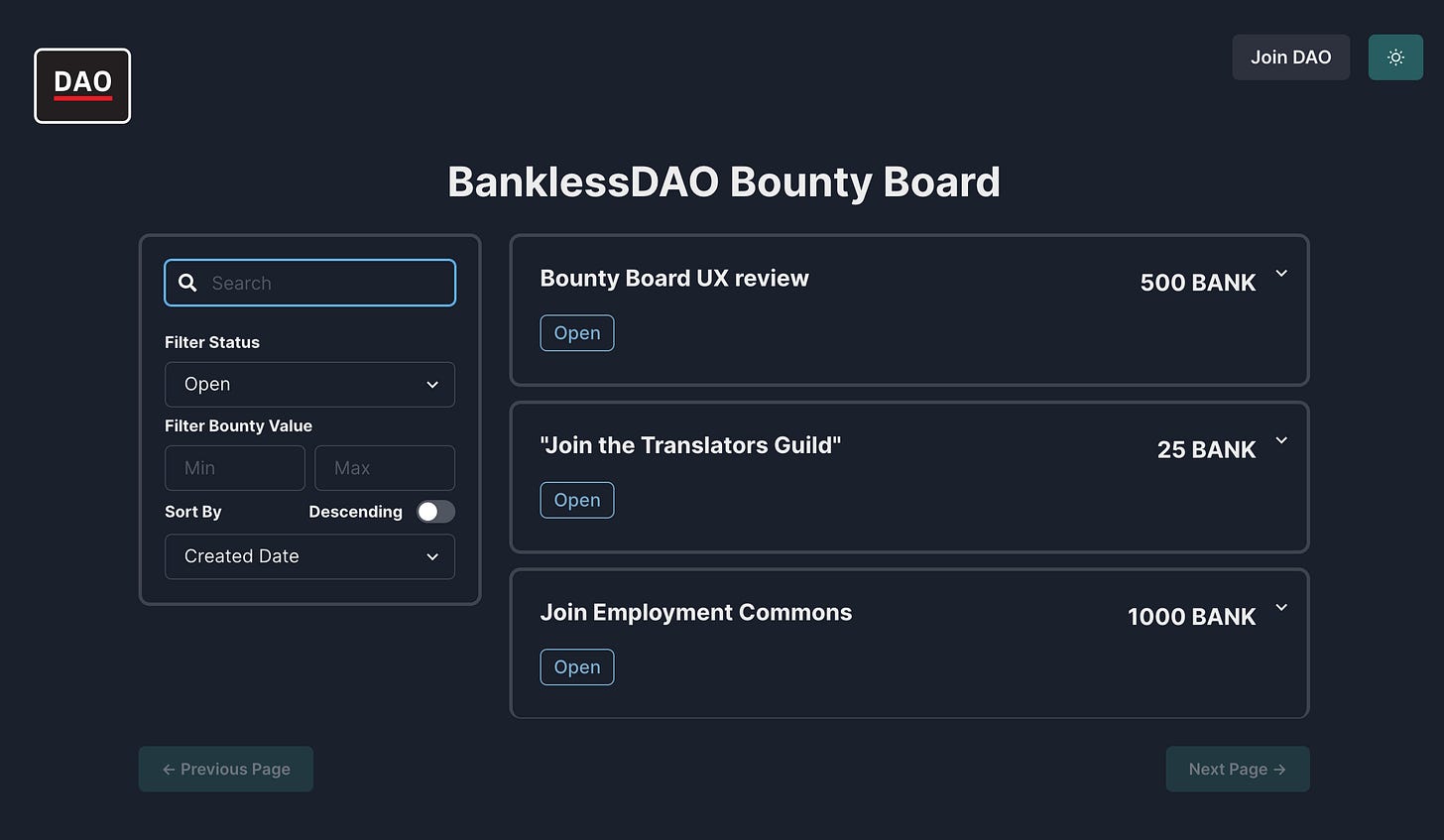everyone's a bounty hunter
The rise of online bounties and what it means for the future of work.
Hoo-hoo-hoo, go on, take the money and run. - Steve Miller
There are two things that consistently make me happy at work: autonomy and snacks. I’ve successfully avoided micromanagement throughout my career by working remotely for some phenomenal companies and building my own. While I genuinely love deciding how I fill my days, there is one dangerous side effect of autonomy: procrastination. With no one checking in every few hours, the less exciting tasks fall by the wayside and the effort required to inspire yourself to finish them increases every minute you wait.
This is where the snacks come in.
When I’ve got a particularly annoying to-do that I’ve been putting off for a while, I offer myself a reward to complete it. Been neglecting calling Gusto customer support to figure out contractor payment issues for the nth time? Do it and you get a few Trader Joe's Sea Salt & Turbinado Sugar Dark Chocolate Almonds. Avoiding your quarterly report for the Commonwealth of Massachusetts? File it and have a few Food Should Taste Good Sweet Potato Tortilla Chips. Even though it’s trivial and somewhat silly, I use snack bounties like this on the regular because it works.
Bounties are an extremely powerful way to gamify almost anything and they’re especially effective at work. Whether it’s a financial reward or something as simple as snacks, setting a bounty for a specific project turns something that has no extrinsic motivation into something that does. While bounties have been around for a long, long time (in galaxies far, far away), they are getting more popular than ever.
With the rise of the out-of-office lifestyle, the Great Resignation, and a budding DAO ecosystem, more folks have been looking for non-standard work arrangements than ever before. Instead of going into an office 9-to-5, completing a daily list of tasks, and commuting home in rush hour traffic, people are now working when they want, choosing what they work on, and doing it all from the comfort of their own home. While these jobs often look similar in a distributed environment as one that’s in an office, some are going to an even bigger extreme where every project they take on is a bounty. Sometimes these bounties are all for one organization (like existing contracting or agency gigs). Other times, the bounty hunters are working for many companies simultaneously. In the future, I believe the best knowledge workers will become pure mercenaries, working on multiple projects for different employers and making a fortune doing so.
While this space is still relatively new, there are already dozens of companies working to make a bounty-centric career more of a reality. Here are a few of those companies and products that are leading the way!
everyone’s a contractor
Contracting and agency work has always been a popular avenue for skilled work. From designers and software engineers to marketers and social media ghost writers, it’s become even more common in the past few years for top talent to work on a project basis. Like the transition from owning your own servers to working in the cloud, tech employers are adjusting to this trend when thinking about their hiring needs. From the earliest stages to pre-IPO unicorns, more startups are paying up to get the best-in-class, temporary talent they need to deploy baller campaigns and products. Companies like Pitch and Notarize hire agencies like MetaLab to come in and give expertise on interface design. At Macro, we hired Calum and An to help us build our social presence and external brand. Working with contractors has been and will continue to be a great way to level up with amazing people without locking them down. With growing innovation in technology and a global shift in mindset though, things are changing. Where once contractors used to be a niche group that would complement full-time staff, companies are toying with the idea of having contractors make up the majority of their workforce. The most visible example of this is with the rise of DAOs.
Bankless, Forefront, FWB, and others are running multi-million dollar enterprises with very minimal full-time teams. They rely on internal bounty boards, guilds, and token rewards to get things done. Five years ago, Bankless might have been started as a startup with a few founding members. They most likely would have stayed small and relied on that core group to complete all of the work from building product to managing the company Twitter. Now, they have hundreds of people to assist with those needs. If they need a new piece of content written for their newsletter, all they have to do is open a bounty for the piece, set a reward in $BANK, post it in Discord, and let the members do the rest. By tapping into the power of community bounties, the group as a whole scales larger than what the core group could have accomplished.
While DAOs are building their workforce from their internal members, Gitcoin is doing the same for open source development in web3. Freelance code bounties are offered to the general public, allowing any developer around the world to jump in and work on exciting new OSS projects that align with their interest. In the past, open source was a passion play often leading to burnt out, underpaid maintainers. With the Gitcoin model, maintainers are actually rewarded for the work that they do via crypto grants.
Layer3 combines the previous two examples by making product bounties available for anyone to complete (not just one siloed community). This solves a fundamental problem in the rise of bounty-based work: connecting the bounty with the bounty hunter. Instead of needing to reach out on Fiverr or some other gig work platform, hunters can find and complete challenges and get rewarded with minimal human intervention. Companies like Layer3 (and RabbitHole for that matter) also differentiate by bringing fun and vibes to the bounty space. By combining an already catchy mechanic in bounties with a delightful user experience, they’ve been able to capture early success. While it’s yet to be seen whether third-party bounty marketplaces like this will be long-term successful compared to an internal DAO bounty board, it’s a strong sign that people are interested in working this way more and more (just look how many of the bounties are “Claimed”).
everyone’s a hacker
One particular area of tech has gone exceedingly deep into bounties: cybersecurity. Even though it may be difficult to wrangle a team of frontend developers into creating a cohesive UI using the bounty method, pen testing and white hat hacking are perfectly suited for it. As a generally solo endeavor, these online security experts are able to complete their jobs almost entirely alone and without much intervention from management or anyone on the development team.
HackerOne was one of the first to capitalize on this, rewarding amateur and professional hackers millions of dollars in bug bounties over the years. By giving organizations “direct access to the world’s top ethical hackers”, they are able to offer an accessible product that would normally be prohibitively expensive and difficult for those companies to manage. In addition to helping companies in need of testing, the coolest thing about HackerOne is that it has created a new generation of ethical hackers to work on these bug bounties. What used to be a fairly small, cottage industry has grown into something that many young technologists are excited to jump into. By giving everyone the education and access to bounty opportunities, they’ve increased the total value of the bug bounty space (and of their company).
With the rise of web3, bug bounties have become even more important in securing smart contracts and crypto infrastructure. Whether it’s foundation-run programs like Ethereum Bounty or platforms like Immunefi, crypto bounties are going to continue to grow in popularity. In this space specifically, there has been a history of black hat hacking since things are much more difficult to track down and recover. With the Bitfinex hack back in the news, it brings up memories of the dozens of examples of multi-million and multi-billion dollar hacks that have temporarily broken our trust in the crypto markets. I personally have a hard time calculating the economics of extended prison time, but perhaps if Razzlekhan was able to confidentially expose a vulnerability and get a sweet couple million dollar payout instead of poorly laundering BTC before getting arrested we might eventually see fewer of these high profile hi-jinx.
everyone’s a recruiter
With talent changing the way they search for and work on new gigs, the recruiting industry will need to fundamentally change with it. As more and more opportunities arise, it’s going to get harder and harder to match candidates to those roles. We’re already seeing this at the early stage, leading some like JMJ to offer a $50k bounty for a single role placement.

OnePager (recently acquired by Stonks which I mentioned in my fintech article) is aggregating these bounties for full-time positions at companies like Uniswap Labs and Array. Other platforms like Talentdrop do the same, allowing people to either refer themselves or a colleague and earn a significant reward. If you’ve tried to recruit technical talent in the last few years, you understand why a $20-50k reward for a placement is definitely worth paying. By productizing the referral requests into a centralized platform, they’re able to multiply the number of eyeballs that will see any individual bounty and give each role a better shot of being filled.
Like HackerOne developing a new generation of hackers, the most compelling side of these platforms is the creation of a new generation of recruiters. Instead of convincing companies to sign engagement letters and contracts to start sourcing for a role, companies are now in the driver’s seat and recruiters get to profit fully by becoming mercenaries. Find a great Solidity dev? Why not refer them to 10 different companies instead of the one you’re engaged with? The future of recruiting could very well be a bunch of recruiters working Boba Fett-style, sourcing across an entire industry instead of for a specific role or organization.
contractors + recruiters
There’s an opportunity here that gets even more interesting and combines the trend towards contractors and recruiters. With the rise of public bounty boards and project-based knowledge work, organizations will now be fighting for placement on those bounties in addition to permanent roles. This will open the door for a new type of recruiter: bounty recruiters. Instead of sourcing for a full-time position, these bounty recruiters will work to match candidates to a specific open bounty. The recruiter could potentially get a cut of the project bounty or get a bounty for placing a worker with that bounty. I’m excited to see how bounties like these disrupt industries and shape careers in ways I haven’t even thought of. The future is bounties all the way down!
As always, if you’re a founder working on a fun product or know of any awesome companies that fit into this category, send them my way at hi@superduperserious.com. I’d love to meet and include them in a future post!







